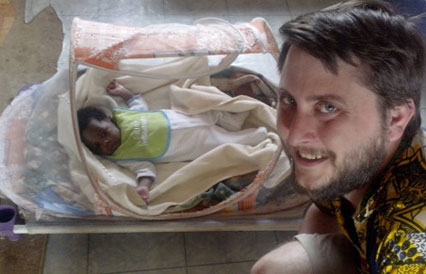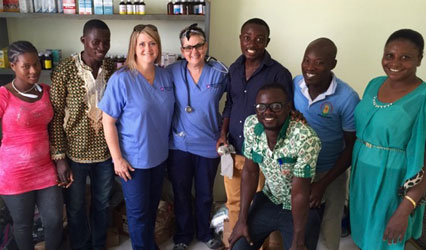When it comes to enhancing your resume, there is probably nothing more impressive than service to others. And when it comes to service to others, completing a medical mission to deliver much needed care to people in an underserved country certainly stands out from the crowd.
AARC members who have been on these missions will tell you it’s about way more than just the resume though.
Back from Ebola
 Michael Davis
Michael Davis“I have been to Liberia nine times for a total of about 50 weeks,” says Michael Davis, BS, RRT, from Virginia Commonwealth University in Richmond. In fact, he was on his way back to the country in late September when we talked to him for this article. “I first visited in 2011 with a mentor who had been before and immediately realized that I wanted to be as involved as possible. Since then, I have opened a non-profit organization for our causes — Partner Liberia — and have spent between two and three months per year there, typically split between two trips.”
 Children at Liberian orphanage
Children at Liberian orphanageDavis and his colleagues work to improve quality of life for Liberians by supporting 12 orphanages in the country — including all of those designated to accept the children left parentless due to Ebola — and they are also helping to bring respiratory care to the nation through the development of the Liberian Respiratory Healthcare Institute (LRHI). The college, which opened in 2012 but was set back about a year due to the Ebola crisis, will graduate its first class of RTs this year.
“Respiratory failure is the leading cause of death in Liberia for all age groups and we aspire to increase the average life span in Liberia and reduce infant mortality by supporting the development of respiratory care practitioners throughout the nation’s health care system,” says Davis.
He is especially proud of the students and faculty who were in the RC program when the worst of the epidemic hit. When the government shut down all the schools, they didn’t just go home to wait it out. They opened and operated the only PICU and NICU available in the entire country and continued to staff them even after the schools were reopened.
Davis’ group installed hygiene stations and secure facilities at all 12 of the orphanages as well, and he is happy to report that none of the orphans, RT students, or LRHI faculty contracted the disease.
We asked him what he gets out of these medical missions and his answer was simple — “everything,” he said. “I love the work that I have been fortunate enough to be a part of in Liberia and only wish I could spend more of my time there. I have a fantastic support network in both the USA and Liberia … and my work there is fun, invigorating, validating, fulfilling. I get the joy of watching a beautiful and wonderful nation recover from two decades of devastation and maybe even contribute a tiny amount towards them — what more could I ask for?”
Improving health is overarching goal
Over the past nine years, Lisa Trujillo, DHSc, RRT, from Weber State University in Ogden, UT, has traveled to Ghana 18 times — twice this past summer alone. During that time she’s taken more than 150 other volunteers with her, many of them students and fellow faculty members in her RT program.
“The overarching goal is to improve health through providing education and medical care,” says Trujillo. In addition to providing community health education and free health assessments, she and her fellow therapists deliver clinical education to health professionals in the nation and they also bring much needed medical supplies, and books and other essential items to give to local primary schools.
 Lisa Trujillo and Karen Schell
Lisa Trujillo and Karen SchellLike Davis in Liberia, they’re helping to establish the respiratory care profession in the country as well. Karen Schell, DHSc, RRT-NPS, RPFT, from the University of Kansas in Emporia, has been accompanying Trujillo on these missions for the past five years and has traveled to the country six times. “Our goal is to provide training and education to health care workers, and particularly, to help with the initiation of the BSRC program at University of Ghana,” she says. “They now have an RT school and hope for the future in improving health.”
Says Trujillo, “It is so exciting to be a part of the program development and to watch the curriculum go through the approval and implementation process. What a powerful and memorable opportunity to provide training for future RT educators, knowing they will be instrumental in developing respiratory therapists who will be vital health care team members, highly skilled critical thinkers, and future leaders in the profession in their country.”
Both Trujillo and Schell believe they’ve gotten much more out of the work they’ve done in Ghana than they’ve given. “It is overwhelming that I could be a part of making a difference through my contributions,” says Schell. “The smiles on their faces, their eagerness to learn, and their overall happiness has changed my life forever.”
Trujillo says she is consistently moved by the kindness shown to her by the Ghanaian people. “Despite our efforts to give all we can through education, donations, and experiences, I always return home with more than I left with. Each experience, each moment of service, is rich and fulfilling, and I learn so much from every interaction I have.”





